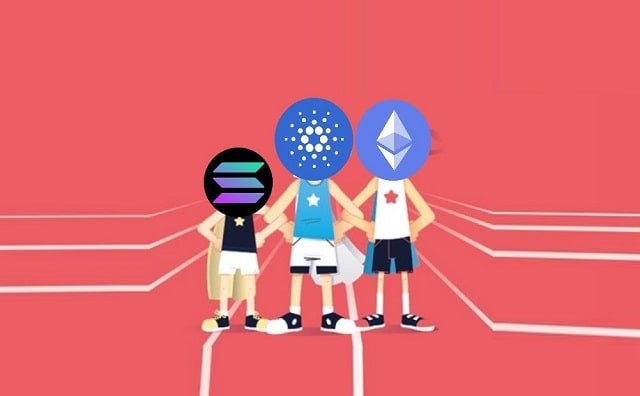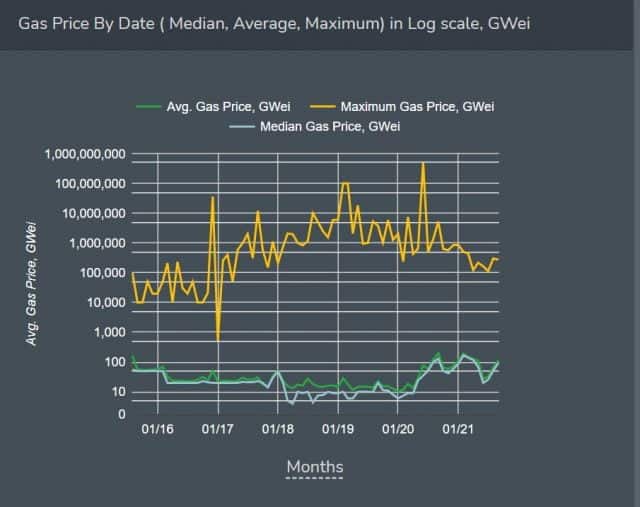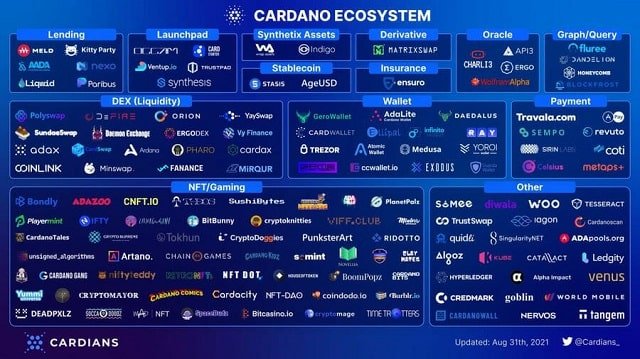1) Detailed comparison of Ethereum, Cardano, and Solana
1.1) Solana vs Cardano vs Ethereum: Consensus Mechanism
1.2) processing speed
1.3) Ethereum, Cardano, Solana Comparison: Transaction Fees
1.4) Cardano vs Ethereum vs Solana: Adoption
In this article, we will compare Ethereum, Cardano, and Solana in detail, all belonging to different generations of blockchains. When comparing ETH, ADA, and SOL, you may be surprised to find that they are very different in certain factors.
A detailed Ethereum, Cardano and Solana comparison
Let’s start with the different generations of blockchain. Bitcoin is the first generation of blockchain. Its sole purpose is to repair and decentralize the traditional financial system. Here you can send and receive funds and conduct transactions. However, nothing else is allowed.
Blockchain Ethereum Cardano Withered Generation 2/3/4
The second-generation blockchain Ethereum proposed the concept of smart contracts. Developers can also build applications on this platform.
More: What is Ethereum ETH?
Cardano is a third-generation blockchain. The first and second generation blockchains have revolutionized the world in decentralized finance, innovation and security. One important point is missing. That’s extensibility. Blockchains like Cardano have emerged to solve this problem. Cardano solves the scalability and interoperability issues.
Learn more: What is Cardano and where and how can I get ADA tokens?
On the other hand, Solana is a 4th generation blockchain. It provides greater scalability by using an open infrastructure. Decentralization, security and scalability. Most blockchains have two of these three properties. But Solana has successfully achieved all three.
Read more: What is Solana (left)?
Solana vs Cardano vs Ethereum: Consensus Mechanism

Blockchain is a structure without bosses. Everyone on the network is the boss. In a blockchain network, decisions are made by participants/nodes. This process is called the consensus mechanism. Each blockchain has a different consensus mechanism.
Blockchain Ethereum Cardano has withered consensus. Proof of Work Proof of Entitlement Validity Period
Ethereum: Ethereum 1.0 currently uses the Proof of Work (PoW) consensus mechanism. However, in ETH 2.0, it is switched to Proof of Stake (PoS). PoS is faster than PoW. PoW also requires very high energy consumption.
Cardano: Cardano uses a proprietary PoS called Ouroboros. No mining required, this model significantly reduces energy usage and computing power. It still maintains the level of security provided by Bitcoin.
Solana: Solana uses a mix of PoS and Proof of History (PoH) consensus mechanisms. PoH creates a historical record by timestamping every transaction and event on the network. These records are used to prove that a transaction has occurred. PoS is used to select the next PoH node through voting. Malicious validators who undermine the interests of the network are also punished by this mechanism. Using PoH has helped Solana significantly improve throughput and scalability.
processing speed
In blockchain networks, transaction rates are calculated in transactions per second (TPS).
Blockchain Ethereum Cardano Withered TPS ~30 ~257 ~57K
Ethereum can currently process about 30 transactions per second. However, Ethereum 2.0’s goal is to reach 100,000 transactions per second. This speed is possible using sharding and other layer 2 scaling solutions.
Cardano’s transaction speed is around 257 TPS.
Solana can process approximately 50,000 transactions per second (TPS). Since Solana is a relatively new blockchain, there aren’t many DApps running. At the same time, the deals here are very cheap.
Ethereum, Cardano, Solana Comparison: Transaction Fees
The fee paid by users to perform cryptocurrency transfers is called transaction fee.
Blockchain Ethereum Cardano Transaction Fee 4-12 USD 0.02 USD 0.0002 USD
In terms of transaction fees, Ethereum has a bad record. For example, transaction fees peaked at $60 in mid-May 2021. The average transaction fee is US$4-12. It is said that transaction fees are falling but rising due to the integration of Ethereum 2.0.
For this reason, more developers are leaving Ethereum in search of cheaper blockchains. The figure below shows the average Ethereum gas cost (1 ETH = 1 billion gwei).

Ethereum Gas Cost Chart
Cardano’s average transaction fee is 0.16-0.25 ADA. You can earn only 1 or 2 cents in US dollars. Cardano uses the lowest transaction fees.
It can be said that Solana’s transaction fee is 60 times lower than that of Ethereum. The fee for each transaction is 0.00025 USD, but it fluctuates from time to time.
Cardano vs Ethereum vs Solana: Adoption
Having a large and active community can make the blockchain more effective and secure.
Ethereum: Ethereum is currently the most used decentralized application platform. There will be no changes soon in this area. There are 2,845 decentralized applications (DApps) running on Ethereum, including decentralized exchanges, NFT marketplaces and online games. This blockchain network hosts over 221 DeFi applications. The most popular Ethereum DApps are Uniswap, Chainlink, Aave, Compound, and OpenSea.
Cardano: In terms of adoption, Cardano still lags behind. Cardano introduced smart contract functionality to the network via the “Alonzo hard fork” in September 2021. More than 100 smart contracts were executed within 24 hours. Additionally, Cardano can now also issue NFTs.

Cardano Ecosystem
Solana: Solana is a low-cost blockchain and network that provides developers with the infrastructure to build applications and serve them to millions of users. It is new, but it has attracted many developers to develop DApps in a short period of time. Currently, there are 338 Dapps running on the Solana network. A blockchain that has been rapidly adopted in a short period of time and considered a direct competitor to Ethereum.
source
Thanks for sharing, it helps…
Information source: Compiled by KOINMEDYA with 0x information. Copyright belongs to the author Cavanşir Gadimov and may not be reproduced without permission.
[ad_2]